Women are well aware of the fact that fertility declines with age, but that doesn't mean we want unsolicited advice about it.
We spoke to women about their experiences being guilt-tripped by doctors about whether and when they should have a baby. Here's what they told us...
1.
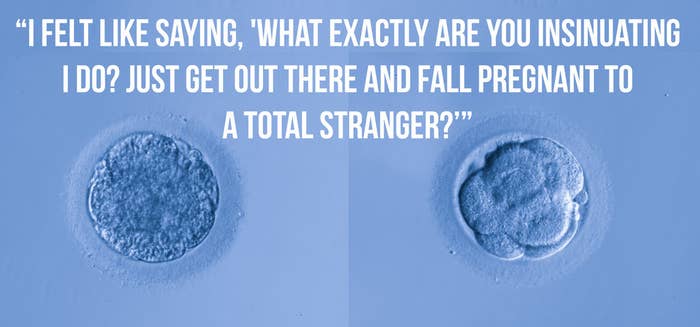
"Many friends in their forties simply left it too late to have a baby, so I have frozen my eggs and have had a lot of doctor appointments about that.
"When I went to a doctor to have the blood test, known as the 'egg-timer test', in search of clarification on my ovarian reserve, they said to me (at age 31), 'Your biological clock is ticking, you better get to it ASAP.'
"With tears streaming down my face I reminded him I was single, but felt like saying, 'What exactly are you insinuating I do? Just get out there and fall pregnant to a total stranger?'" – Juliette Saly, journalist from Sydney
2.
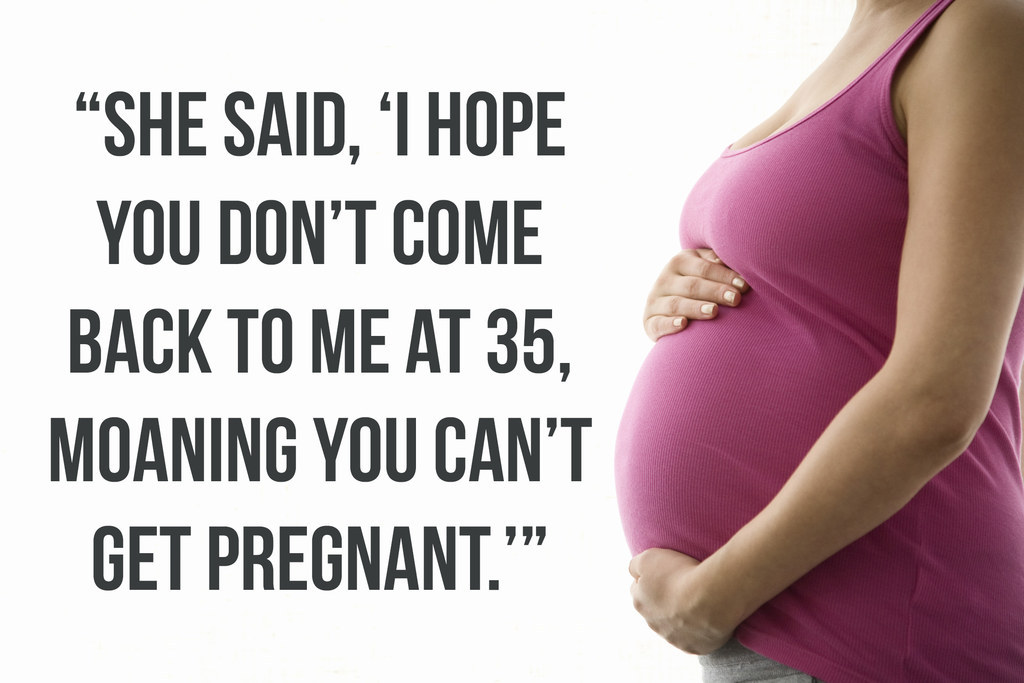
"I once went to get the pill from my GP, a wizened old woman who said, 'I hope you're not one of those women who'll come back to me at 35, moaning you can't get pregnant.' I was 26 at the time." – Anonymous
3.
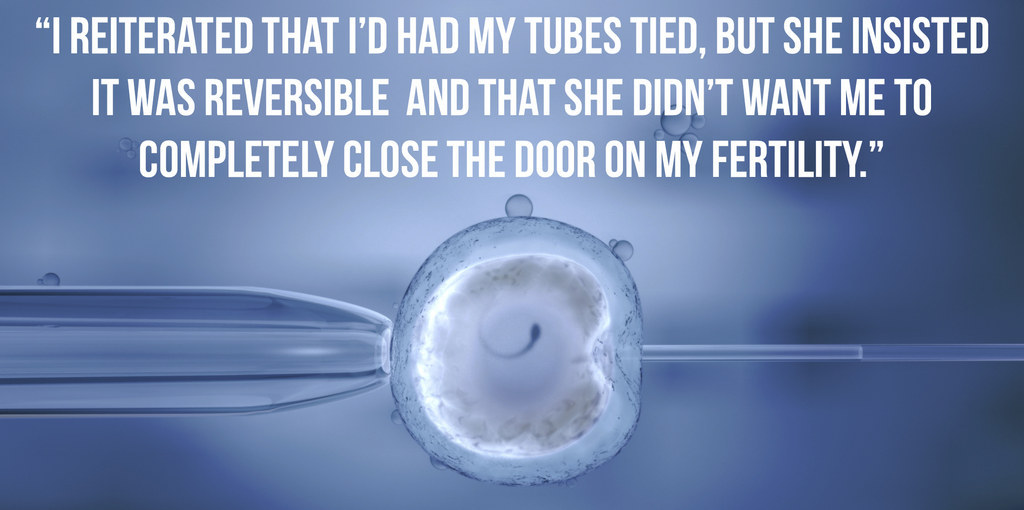
"I'm 38 and had painful periods and flooding from the age of 12. I was diagnosed with endometriosis at 15. In my mid-twenties I had my tubes tied, as I have never wanted children and my endometriosis made it unlikely I'd be able to have them without help anyhow. I managed my periods during my twenties and early thirties with the help of multiple medications but I still had flooding, pain, and very long periods (7–10 days). I was spotting in between periods, and when I had my period I could easily flood through a tampon and pad in 45 minutes.
"When I hit 35 I had finally had enough. I got a referral to a gynaecologist for a laparoscopy, which I'd had before, and I also wanted to ask about an endometrial ablation, a relatively common procedure where the endometrial lining is burned away, meaning you don't have periods. This can be permanent, or the lining can grow back in five years or so but most patients end up with lighter periods if this happens. Crucially, ablation technically renders you infertile – your womb can't support a foetus after it's been done, but this wasn't an issue for me because I'd had my tubes tied 10 years earlier.
"The gynaecologist had a bible on her desk, which made me feel uncomfortable. When I asked about ablation, he said I was only 35, and I had time to "change my mind" about having kids. I reiterated that I'd had my tubes tied, but she insisted it was reversible and that she didn't want me to completely close the door on my fertility.
"I'd had my tubes tied for over a decade and I could potentially have heavy, awful periods for another 20 years. I left the appointment feeling really dejected – like a stupid child who had been patted on the head and told she couldn't know what she wanted.
"When I went back for my laparoscopy three months later I saw a different gynaecologist and asked if it was too late to consider ablation. He looked at my notes and said because I had had my tubes tied there would be no problem with me getting an ablation that day, so I went ahead with it and I haven't had a period since. My life, and health, is so much better.
"I spent the three months between the consultation and operation feeling so patronised and like I didn't know my own mind. It's completely possible for a woman in her mid-thirties, or even mid-twenties, to know that she never wants children and to arrange her life to suit that. Plus, women who know they want children are never told they might 'change their mind'. – Anonymous
4.
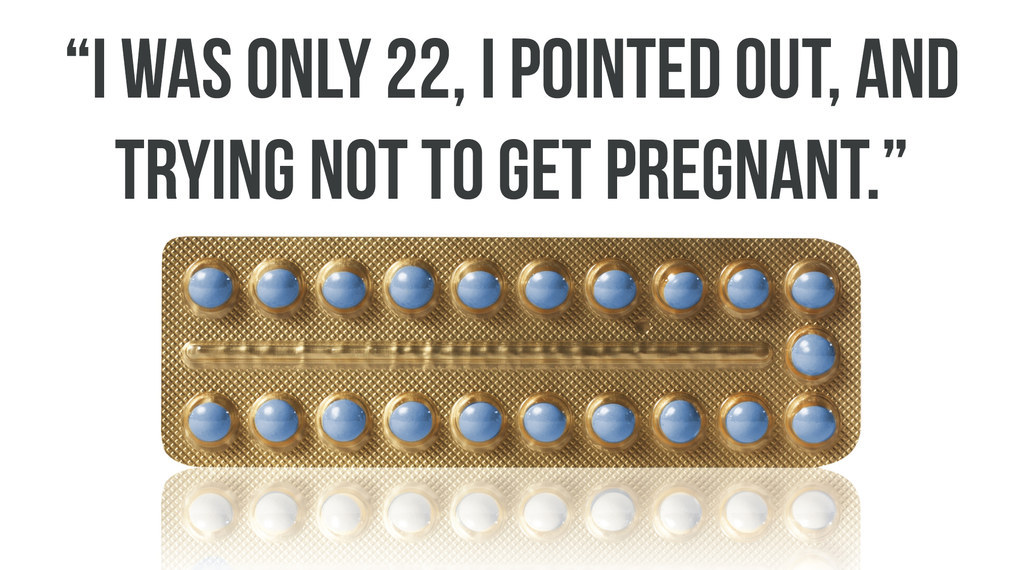
"My ex-gynaecologist advised me not to get an IUD because hormonal birth control pills would slow the aging of my uterus and ovaries and preserve my fertility. I was only 22, I pointed out, and trying NOT to get pregnant.
"She told me she could tell I was the kind of woman who wanted to put off having kids until the last minute, and then I'd be sorry." – Anonymous
5.
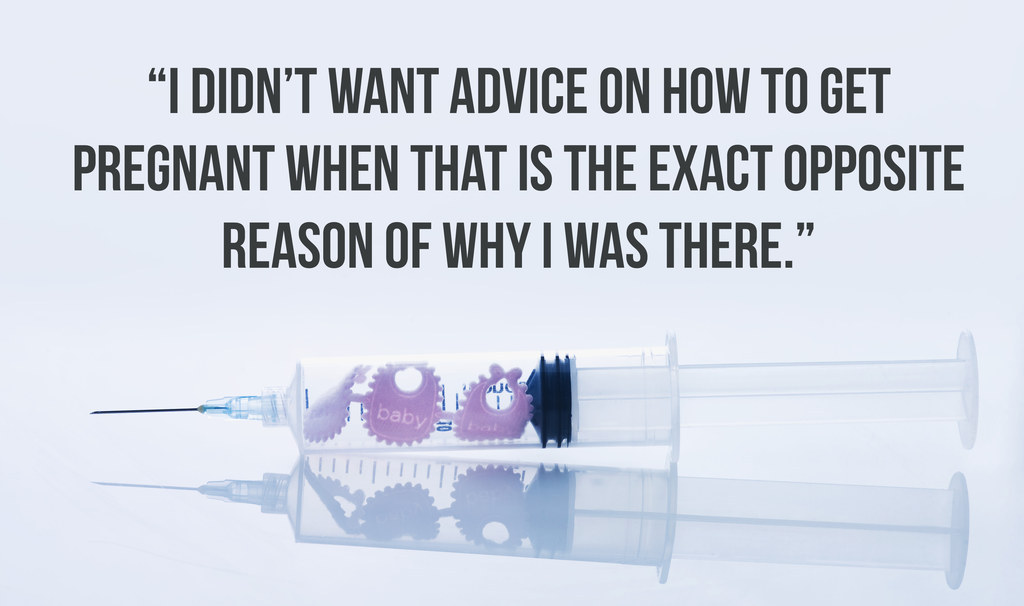
"I was 26 and a nurse (after suggesting I was overweight and should do 'whatever it takes' to lose weight) gave me unsolicited fertility advice after learning I was married.
"I was there to renew my pill prescription, and she also handed me a flier on 'building a family' and said I might want to think about having a coil put in, or maybe have an implant as that means I'll be able to get pregnant faster when I decide to have children.
"The thing is, I didn't ask. I wanted the pill. I didn't want advice on how to get pregnant when that was the exact opposite reason of why I was there." – Anonymous
6.
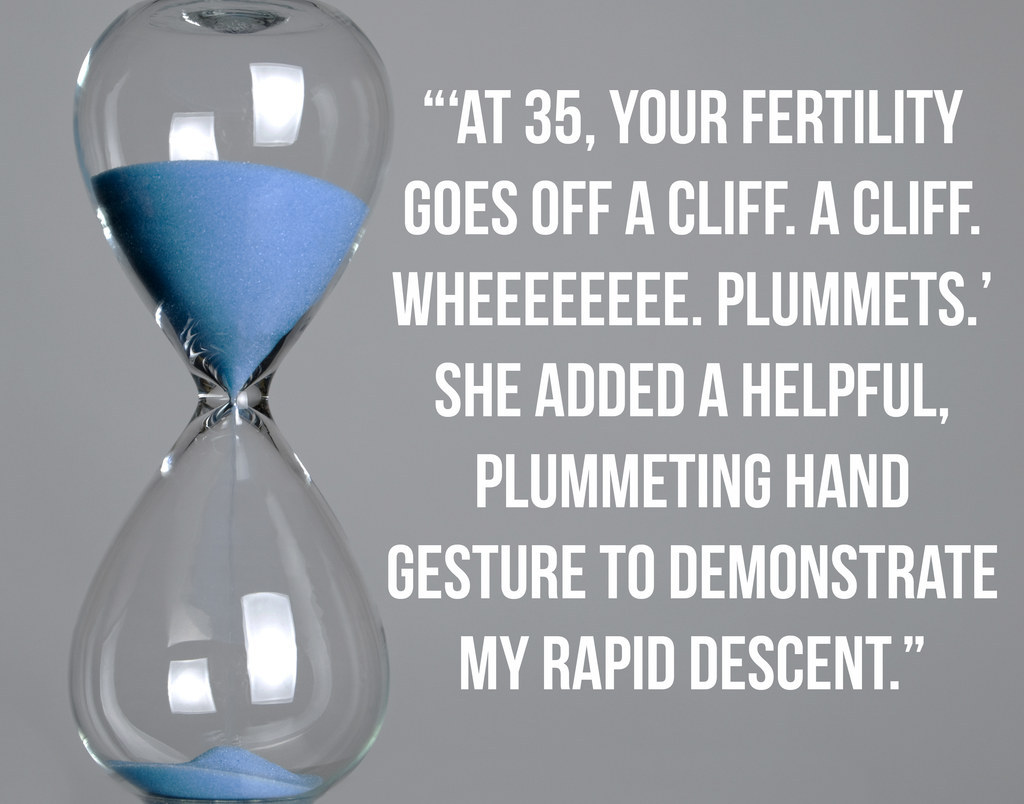
"I initially went to my GP to ask about a polycystic ovary syndrome (PCOS) diagnosis, not with fertility concerns but because of thinning hair and daily plucking of an ever-more-bristly beard/moustache. I saw my GP, nurses, a gynaecologist, and a technician who did vaginal ultrasounds and blood tests, and no one mentioned fertility.
"I was prescribed the pill, and when I came back six months later for a check-up I asked my new gynaecologist about how all this would affect getting pregnant, explaining it wasn't a pressing issue – I have a huge work year ahead and a cross-country move to organise. She was all smiles about the state of my ovaries and hormones, until she asked, offhand, how old I was. I replied, '34 in three months'.
"Cue triple-Exorcist head spin, giant breath-suck, and the kind of I'm-looking-at-a-disaster grimace you only see in apocalypse films. 'At 35, your fertility goes off a cliff. A cliff. Wheeeeeeee. Plummets.' She added a helpful, plummeting hand gesture to demonstrate my rapid descent. 'Just gone. Wheeeeee. Off a cliff.' A cliff." – Anonymous
7.
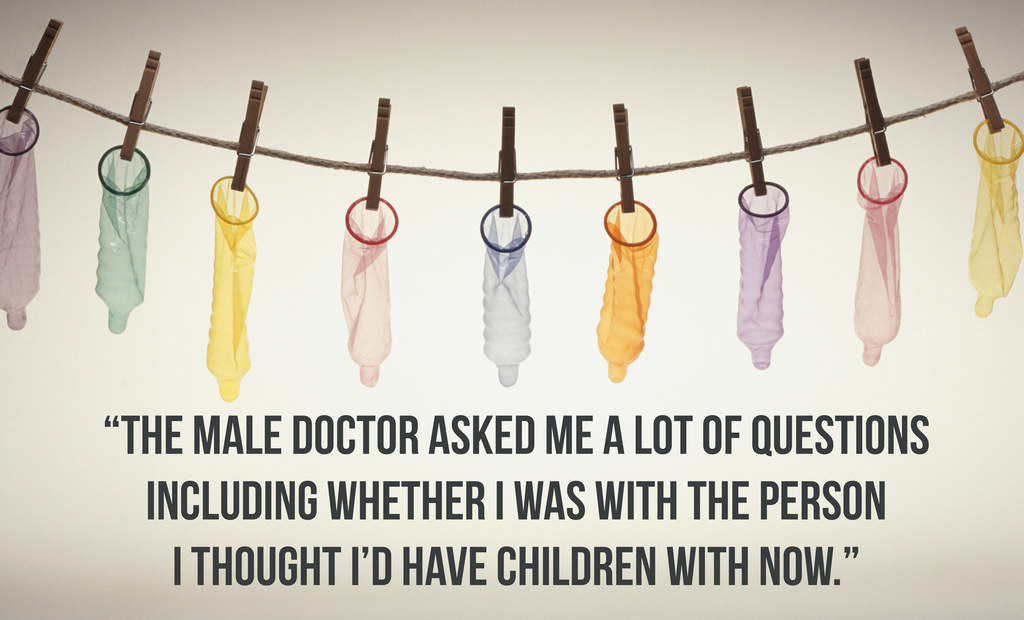
"I went to the doctor to go back on the pill after getting back into a relationship. The male doctor, in his mid-fifties, asked me a lot of questions about whether I already have children and whether I wanted them, and then whether I was with the person I thought I'd have children with now.
"Having only been seeing this person for about two to three months, I said I didn't know. The doctor replied, 'At your age it's something you need to think about.' I wish I'd had a better quip to respond with at the time, but I was too shocked by his comments.
"I felt like I was being judged for taking a sensible approach to birth control. Just because I'm 30 doesn't mean that I want an unplanned pregnancy with someone I've just met because it 'might be my only hope' of having children.
"I wonder at what age some doctors decide, 'Screw being in a stable relationship with someone who you want to choose to bring up a child with, you need to get yourself fertilised now or your life purpose will be lost.'
"If I was 22, I think the response might have been very different." – Anonymous
8.
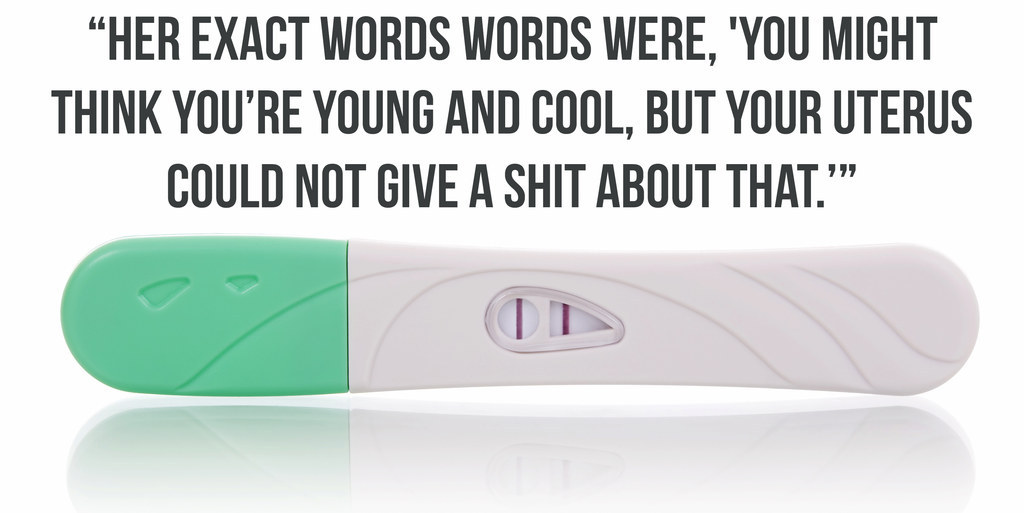
"I was 15 when I first presented with symptoms of endometriosis, and my doctor told me that I was 'too young' to have endometriosis, but that I could consider getting pregnant to alleviate the symptoms.
"So, I was too young to have a medical condition, but not too young to have a child... It wasn't the last time I received ridiculous advice from doctors who I trusted to help me. Most recently, my gynaecologist informed me, after suggesting she was going to remove my right ovary, that I should immediately have a conversation with my partner about not using contraception and begin trying to conceive, because the clock was ticking away on my ability to fall pregnant and, she explained, the closer I edged to 35 the more difficult it would be.
"Her exact words words were, 'You might think you're young and cool, but your uterus could not give a shit about that.' I had just turned 30." – Anonymous
